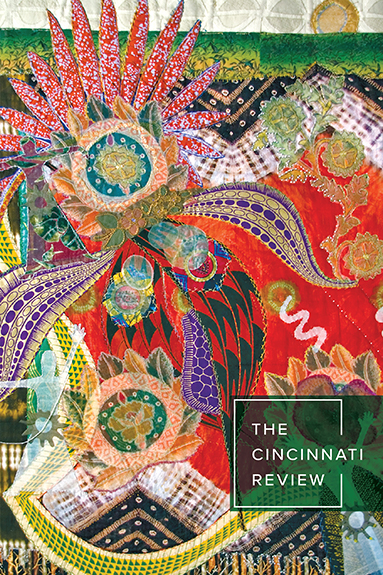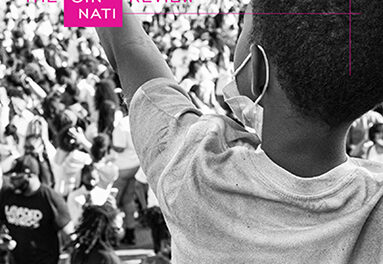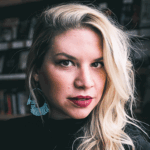It takes very little to become a difficult patient. Having questions, feeling unexplained or anomalous pain, being uncajoled, seeming nervous for one’s first dose of chemo. The nurse looked at me sideways as I walked into the chemo-complex, and asked, “Are you all right?” as if I should have been. As if I looked excessively worried or alarmed. Having never had much business with the medical industry, and never with the drugs that kill to save, I was both worried and alarmed. I could hear a tone, one that thought it might have to manage me, that was already managing me. Sigh, we’ve got a spooked one.
There is the model of the cheerful chemo patient: cracking jokes, putting everyone at ease with the specter of death-in-life, wearing neon wigs in the chemo room and around town—Why not? Life is short—maybe 6 months short! Ba-dum-bump! This was not me. I didn’t want to be wise or responsible for the ease of others. I wanted to be invisibly, independently terrified. If I had to dissolve into the netherworld between life and death, I wanted to do so quietly.
The room was dilapidated, lined with sagging La-Z-Boys and people nodding off as poison dripped in. Each in full view of the others, the most disconcerting open-plan design imaginable. It was like walking into a fluorescently lit shooting gallery, with hangers-on gathered on plastic chairs, eating fried food out of paper bags while their loved ones get unbelievably fucked up. Beepers went off frequently across the room, as if patients were flatlining. But no one ran, all of us beached in our recliners, belly up in the caustic light of our illest hour.
It is a misunderstanding of human to say this was dehumanizing. I keep learning and forgetting this.
*
I had been studying up online, trying to prepare myself, and something—what? some phrase, some detail about so-and-so bringing their favorite cozy blanket each week, hearing the shush of a rock fountain?—made me anticipate a spa atmosphere in the chemo room. Perhaps the breast clinic had set my expectations. At the clinic, they hand you a Hilton Hotel–quality white robe and ask you to wait in a burbling room with massage chairs and coffee and a few old-fashioned desks, as if we might just take care of some tardy correspondence while we wait to have our breasts crushed into thin schmears. Then we wait again, if we’re unlucky, to get the splooge + wand treatment; wait again, if we’re really unlucky, to have a very thick needle take core samples of our chests. If you are further unlucky, your radiologist is petite and your “tissue” is “unusually dense,” and she must practically climb atop you with that needle and root around with extra leverage. But you return to the spa room every time and its barber pole of burbling water.
The dissonance made me feel as if I might be crazy. On one side of the door was a facsimile of female indulgence culture—Girl, take a load off, you deserve this. We’re just here with all of our stranger-girlfriends flippin’ through lady magazines. Sit in a mechanized chair and let it touch you deeply, because god knows no one else might be doing that, amIright? Then your name is called—I’m takin’ another turn when I come back!—and you pass the threshold and its gatekeeper with the clipboard and the scanner for your armband, and you enter the descending rings of bad news. Back and forth across the threshold. Until either you get released into purgatory or you have the bad news. Or at least the first corner of it.
Someone had crafted this experience, had thought we small herd of ladies could have our pleasure-reward centers stimulated enough to counterbalance the din of death on the other side of the gatekeeper. Like moving repeatedly between the dining room and the kitchen, if you yourself were on the menu.
This is to say that the diagnosis spa had probably shaped my expectations for a chemo spa. A hilarious miscalculation. No hush or sheen or burble. No plum and beige and crown molding and sconces. Not even a fucking curtain. At the chemo shooting gallery, they made no effort to disconnect you from the experience you were having. And I did not know at first to be grateful for that.
*
Before the spa, I had thought I would make a gradual, if reluctant, acquaintance with mortality and incapacity. Maybe in another decade I would start to ache more, in two or three, perhaps a knee replacement. Later still, maybe a fall, a hospital infection, a swarm of forgetting. I could nod at that procession, indistinct in the distance.
“You’ll probably fall asleep within the first hour from the drugs we’re administering,” the chemo nurse said, “and have good long rest.” As if that’s what we’d come for—a rest we could not get at home.
I was grimly determined about the process, so grim that I took no one with me to the chemo room. But the idea of sleeping—of an uncontrolled release of vigilance—in this room, in this chair, while I submitted to the bludgeon of concentrated, imprecise chemo? I wanted to bolt. I had skipped the line thirty or forty years to the public smorgasbord of side effects—quiet moaning and retching, a doctor apparating next to your recliner if you were really bad off. In the chemo room they dispensed with facsimiles of wellness. They didn’t nod tightly when you asked if they thought it was malignant, as they had at the spa. They handed you a sheet with every number they could pull out of your blood. The netherworld was a numbers game—how low could they go before they all went to zero? The chemo room was setting us at the lip of a crevasse with a wisp of twine around our waists, nudging us forward and tugging us lightly back. Us, that is the pronoun.
Part of the problem was that I had walked in, sturdy and speedy, with hair, not young but perhaps the youngest in the room. And part of me thought I would run rather than become the same species as the infirm. But I was already the same species, of course.
. . .
For more of this essay or other great literary nonfiction in Issue 20.1, order now in our online store. Digital copies are only $5!










